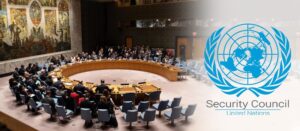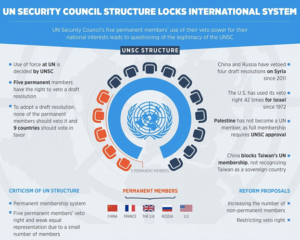Modi asks G20 leaders to reform Security Council.
Relevance:
- GS Paper – 2, Important International Institutions, Groupings & Agreements Involving India and/or Affecting India’s Interests, Effect of Policies & Politics of Countries on India’s Interests.
- Tags: #UNSC # Security Council # GS paper 2 # Veto Power # India entry in Security Council.
Why in the news?
- Indian Prime Minister Narendra Modi on Sunday urged world leaders assembled at the G20 leaders’ summit to make global structures, including the UN Security Council, reflective of current realities.
- At the G20 summit session, India’s claim for permanent membership of the UNSC was unambiguous and cautioned that it is a natural law that individuals and institutions that do not adapt to change tend to lose their relevance over time.
About UNSC
- The UNSC, with a mandate to maintain international peace and security, is the centre piece of global multilateralism.
- It selects the UN Secretary-General and plays a co-terminus role with the UN General Assembly in electing judges to the International Court of Justice.
- Its resolutions, adopted under chapter VII of the UN charter, are binding on all countries.
The UNSC is composed of 15 members, 5 permanent and 10 non-permanent
- Five permanent members: China, France, the Russian Federation, the United Kingdom, and the United States.
- Ten non-permanent members: Elected for two-year terms by the General Assembly.
India’s Membership
- India has served seven times in the UN Security Council as a non-permanent member and in January 2021, India entered the UNSC for the eighth time. India has been advocating a permanent seat in UNSC.
Need for reforms in UNSC
Regional representation
- Supporters of UNSC reform claim that there is a huge European bias in P-5 due to the presence of the United Kingdom and France including Russia.
- While regions like Latin America, Caribbean group, Arabs and Africa do not have a single permanent member. Similarly, there is a western bias in UNSC. As China is the only Asian country among the five permanent members of UNSC.
- Thus a large chunk of the population and many different regions of the world remain unrepresented in the permanent membership of UNSC.
- It seems highly unfair that the whole continent of Africa does not have a single member in P-5 despite the fact that most of the affairs of the body concern this part of the globe only.
- So regions like Africa and Latin America and others will have to be accommodated in the reformed UNSC.
Changing geopolitics
- The victors of World War II shaped the United Nations Charter in their national interests, dividing the permanent seats, and associated veto power, among themselves.
- It has been 72 years since the foundation of UNSC. During this period, the geopolitical realities have changed drastically, but the Council has changed very little.
Question of Veto
- All five permanent members of UNSC enjoy a veto power.
- Veto is a kind of negative vote by a permanent member that prevents the adoption of a proposal, even if it has received the required overall votes by the members.
- Sadly, veto power is grossly misused by the permanent members in their own national interest.
- Out of 24 vetoes over the last 20 years, 15 have been used by the United States to protect Israel.
- This also badly affects the conduct of the business of UNSC as many important proposals involving substantive issues get blocked due to use of veto by any of the five permanent members.
G-4 and India s quest for a permanent seat
- In recent decades, India has been very vocal in demanding for a permanent seat in UNSC. It is also part of G-4, a group of 4 nations (India, Brazil, Germany and Japan) to lobby for permanent positions on the UNSC or at least to make the council more representative.
- Many member-states have been pledging support for our aspiration for permanent membership. Several P-5 countries have also announced their support. At present, China is the only P-5 member opposing India s bid.
- G-4 wants to expand the permanent seats in the UNSC to 10 to include 6 new members G-4 nations apart from one seat to Africa and one seat to Arabs
Transparency and Working Methods
- While the expansion of the Security Council has been hotly debated across the world, debate on the working methods of the Council, an equally important aspect of reform to many member states, has attracted less attention.
- It is true that UNSC has been functioning in the most non-transparent and non-consultative way.
- The undemocratic nature of UNSC within the supposedly democratic UN has compromised the overall credibility of the United Nations.
Why India should be given a permanent seat in the council?
- For the first 40 years we did not want permanent membership. In 1993, we submitted a written proposal but did not mention that we need permanent membership.
- Only after that we have started asking for a permanent membership in the council. India was among the founding members of United Nations.
- It is the second largest and a one of the largest constant contributor of troops to United Nations Peacekeeping missions.
- Today, India has over 8,500 peacekeepers in the field, more than twice as many as the UN’s five big powers combined.
- India, since long time, has been demanding expansion of UNSC and its inclusion as permanent member in it.
- It has been a member of UNSC for 7 terms and a member of G-77 and G-4, so permanent membership is a logical extension.
Source: Livemint.
Mains Question.
Discuss the various reforms which are required in UNSC wrt India’s demand for a permanent seat in UNSC.





